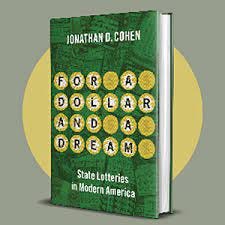The Price of the Ticket
Lotteries and the American Dream
What is the point of this story?
What information pertains?
The thought that life could be better
is woven indelibly
Into our hearts and our brains
—Paul Simon, “Train in the Distance” (1983)
As I once explained many years ago, the American Dream has come in many forms—commercial success, political independence, religious salvation, the secular grace of celebrity, and more—but they all have one thing in common: an emphasis on human agency. Achieving the Dream was never guaranteed, but a notion of plausible attainment was premised on the proposition that individual effort could make a difference. Endorsement of this idea was never universal—there were plenty of people who were systematically excluded from playing any given version of this game, as well as skeptics who weren’t. But the Dream’s potency was always too great to be ignored.
That said, there have always been alternative versions of the American Dream which, if not quite entirely outside it, nevertheless rejected some of its core tenets. Many Americans envisaged hard work leading to success—success all the more savored because it was earned—but there were always those whose dreams rested on success without the hard work, whether as a matter of enslaving people to do it, spiking a geyser of wealth, or winning a game of chance.
Those games have always taken many forms. But among the most durable have been lotteries, which in America date back to colonial times. Lotteries have always been controversial, whether as a matter of fostering immorality, addiction, or crime. They have tended to be illegal, as indeed they were in the United States for much of the 19th century. But as Jonathan Cohen explains in his fine new book For a Dollar and Dream: State Lotteries in Modern America, government-sponsored lotteries have become a notable feature on the national landscape in the last half-century, largely shedding the stigma attached to them. (Full disclosure: Cohen, a scholar of gambling and a program officer at the American Academy of Arts & Sciences in Cambridge, is an editor of a volume of Bruce Springsteen essays to which I am a contributor.)
For Cohen, one of the great ironies of state lotteries is that among the most incorrigible gamblers in these enterprises have been governments themselves. Such games first emerged in modern form in New Jersey in 1970, promoted as an effortless source of public revenue: they would curb organized crime, keep money that would otherwise be siphoned off into neighboring state lotteries, and—most importantly—maintain public services without tax increases. In every case, however, lotteries have come up financially short. The promised revenues never materialized anywhere near assumed, which has been worse than disappointing, because taxpayers became more resistant to paying for services they incorrectly believed lotteries would cover. Lottery promoters (which is to say government officials as well as private-sector interests who profit from them) have retooled their pitch over the course of decades, whether by presenting lotteries as serving as a dedicated stream of revenue for particular operations (like public education spending in California) or programs designed as welfare for individual citizens (like college scholarships in Georgia). Originally a Rust-Belt phenomenon, lotteries spread west in the 1980s and eventually took root in the South, where evangelical resistance had been strongest, at the end of the twentieth century.
Games of chance in general, and lotteries in particular, are anthropological—you can find them in all times and places—but Cohen carefully historicizes the recent U.S. lottery boom as symptomatic of neoliberalism in an age of economic decline. American governments, whether federal, state, or local, had trouble meeting the expansive promises of the welfare state in the second third of the 20th century, and increasingly resorted to gimmicks as a means of papering over fiscal cracks. Such stresses were also playing out in individual lives and families; Cohen deploys ethnographic strategies to vivify the ways particular people fantasized about lottery winnings solving their financial problems. Yet, as he shows, there was something counterintuitive about this: the most popular games, like Lotto, also had the longest odds. Dreams of wealth grew more fabulous as economic prospects ebbed.
There is (and always has been) a political valence to lotteries: they sidestep, if not outright reject, notions of meritocracy that have been sacred to elites from the Puritans to the inheritors of the modern secular universities they founded. For those skeptical or hostile to prevailing notions of respectability, ideas about merit or worth are at best a matter of self-flattery for those who espouse them and at worst a form of social control to be resisted by flouting cultural norms.
And yet, as Cohen notes, there is a curious contradiction about this. He cites a series of lottery winners who retroactively attribute their success to divine origin. Prayers answered become worthy causes. Even at their most subversive, it seems, lottery dreamers still cling to notions of agency. You win by buying in.
Again: the fantasy of getting rich quick is not an intrinsically American one. But American lotteries operate in a cultural matrix of individual aspiration that is, for better or worse, uniquely strong in the United States. I suspect this will be the last thing we surrender. It’s almost impossible to imagine our doing so.

